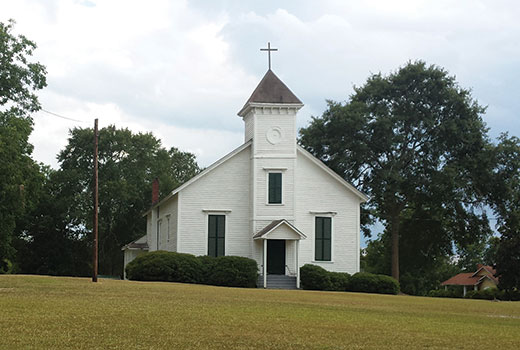The Southern Baptist Convention has been called a convention of small churches. Scattered across the SBC landscape are many rural churches. The good news is that, while rural areas and churches were once declining in numbers, that trend began to reverse itself in 2011.
Hannah Anderson, author of “Humble Roots,” writes that rural churches feel like family because in most cases they are family. “This sense of longevity can help put ministry struggles in perspective. There is less pressure for you to be on the cutting edge.”
Buddy Amerson, pastor of Spring Branch Baptist Church in Hartsville, will soon turn 77 and has no immediate plans to retire. “I don’t see retirement mentioned in the Bible,” he says. He has been the pastor at Spring Branch for the past 42 years. The church will have anywhere from 50 to 90 people attend the Sunday morning worship service. He said, “Within a 10-mile radius, there are eight churches — and our church may be a little bigger than most of them.”
What is the secret to a long and faithful pastorate at a rural church? Amerson says, “Love the people. Laugh and cry with them. Be with them in the good times and the bad times.”
Some challenges for rural pastors he sees are that the people are often spread out and, like in a church of any size, there are not enough dedicated members.
“They call me the community pastor. We are all like family,” Amerson says. “They trust me, and, while they don’t want a pastor to camp out on their doorsteps, they know if they need me, I’ll be there.”
An article from the United States Department of Agriculture stated, “Since 2011, fewer people have been moving out of rural areas and more people have been moving in. People moving to rural areas tend to persistently favor more densely settled rural areas with attractive scenic qualities, or those near large cities.”
According to Thom Rainer, former president and CEO of LifeWay Christian Resources, “If you include areas under 2,500 in population, there are 60 million people living there. That is a huge mission field that cannot be ignored.”
Fred Griggs, 72, is the pastor of Lowndesville Baptist Church in Abbeville County. It has been called one of the most rural places in the state. The church is currently building a new sanctuary, thanks to a large gift. Griggs believes the major key in pastoring a rural church is to know you are called to it. “I pastored a larger church once, but it was not a good fit,” he says, adding that God sent him to Lowndesville.
Griggs grew up in Hartsville and moved to Kannapolis, N.C., when he was a senior in high school. He joined the Marine Corps in 1968 and married his wife, Jean, in 1970. They moved from California back to North Carolina before settling in at Lowndesville, where he has served the church for the past 21 years.
“You have to reach people and know the people in your community — learn the personality of the church. If you love rural people, they will love you back, and you will become family with them,” he said. “You cannot ever think you have arrived, and you must be always cultivating your gifts and making adjustments.” He stated that he went to school for 35 years, finishing a master’s degree from Anderson University in 2011 and, later, a doctorate from Covington Seminary. “I think you should always be learning.”
The new auditorium will seat 212 people. The old one, which would hold about 150, has been razed, and the new building will occupy the space where the old auditorium stood. Lowndesville Baptist has about 70 to 80 regular attenders.
Rainer wrote, “The obituaries of rural and small-town churches are premature. The simpler life of rural or small-town areas is becoming increasingly attractive to many people, including church leaders. The revitalization and replanting movement is growing. Among those churches in this growing movement are churches in rural areas and small towns. It is an incredible thing to watch.”

